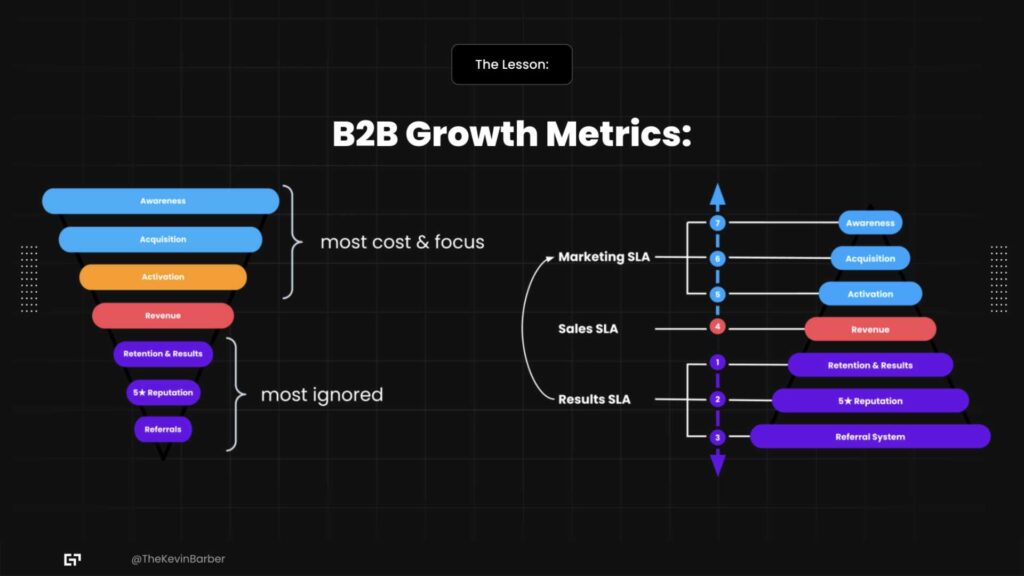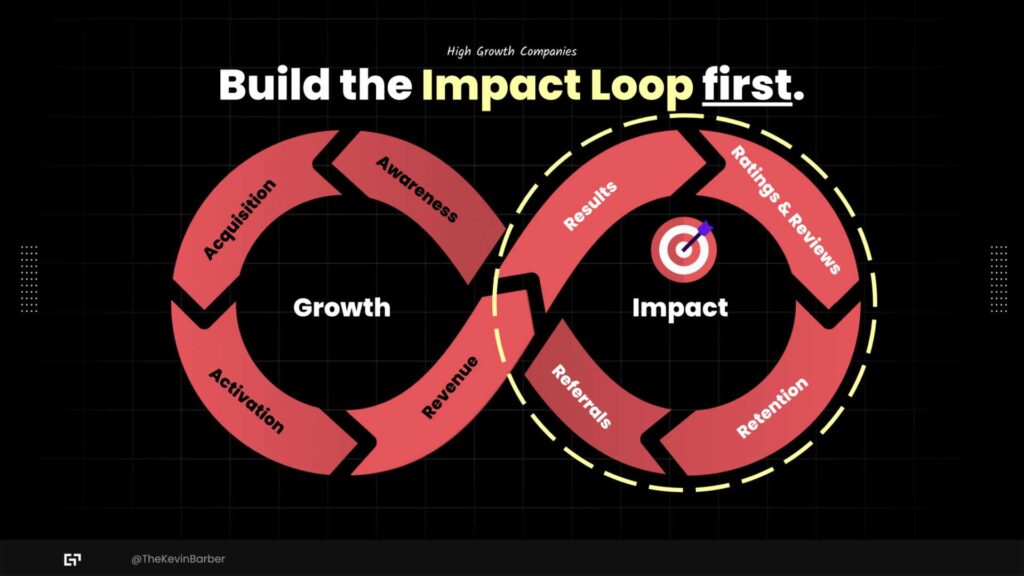
You ask the head of marketing how the team is doing and get a giant thumbs up. 
“Our MQLs are up!”
“Website conversion rates are at an all-time high!”
“Email click rates have never been this good!”
But when you ask the head of sales the same question, you get the response that echoes across sales desks worldwide — the leads from marketing suck.
If you’re in this boat, you’re not alone. The issue of “leads from marketing suck” is a common situation in most organizations. In a HubSpot survey, only 9.1% of salespeople said leads they received from marketing were of very high quality.
Why do sales teams hate marketing-generated leads? And how can marketers help their sales peers fall in love with their leads?
Let’s dive into the answers to these questions. Then, I’ll give you my secret lead gen kung-fu to ensure your sales team loves their marketing leads.
Marketers Must Take Ownership
“I’ve hit the lead goal. If sales can’t close them, it’s their problem.”
How many times have you heard one of your marketers say something like this? When your teams are heavily siloed, it’s not hard to see how they get to this mindset — after all, if your marketing metrics look strong, they’ve done their part, right?
Not necessarily.
The job of a marketer is not to drive traffic or even leads. The job of the marketer is to create messaging and offers that lead to revenue. Marketing is not a 100-meter sprint — it’s a relay race. The marketing team runs the first leg and hands the baton to sales to sprint to the finish.
To make leads valuable beyond the vanity metric of watching your MQLs tick up, you need to segment and nurture them. Screen the leads to see if they meet the parameters of your ideal customer profile. If yes, nurture them to find out how close their intent is to a sale. Only then should you pass the leads to sales.
Lead Quality Control is a Bitter Pill that Works
Tighter quality control might reduce your overall MQLs. Still, it will ensure only the relevant leads go to sales, which is a win for your team and your organization.
This shift will require a mindset shift for your marketing team: instead of living and dying by the sheer number of MQLs, you need to create a collaborative culture between sales and marketing. Reinforce that “strong” marketing metrics that result in poor leads going to sales aren’t really strong at all.
When you foster this culture of collaboration and accountability, it will be easier for the marketing team to receive feedback from sales about lead quality without getting defensive.
Remember, the sales team is only holding marketing accountable so the entire organization can achieve the right results. It’s not sales vs marketing — it’s sales and marketing working together to get a great result. Nothing more, nothing less.
We’ve identified the problem and where we need to go. So, how you do you get there?
Fix #1: Focus On High ROI Marketing Activities First
What is more valuable to you:
- One more blog post for a few more views?
- One great review that prospective buyers strongly relate to?
Hopefully, you’ll choose the latter. After all, talking to customers and getting a solid testimonial can help your sales team close leads today. Current customers talking about their previous issues, the other solutions they tried, why they chose you, and the results you helped them achieve is marketing gold.
On the other hand, even the best blog content will take months to gain enough traction to impact your revenue.
Still, many marketers who say they want to prioritize customer reviews focus all their efforts on blog content and other “top of the funnel” (Awareness, Acquisition, and Activation) efforts.
The bottom half of the growth marketing funnel (Retention, Reputation, and Revenue) often gets ignored, even though it’s where you’ll find some of the highest ROI activities.

Most marketers know retaining a customer is easier than acquiring a new one. But knowing this and working with sales on retention and account expansion are two different things.
When you start focusing on retention, upselling, and expansion, your entire organization will feel it, from sales to customer success. These happier customers will increase your average account value and drive awareness through strong word of mouth, giving you one heck of a win/win.
Winning the Retention, Reputation, and Referral game also helps feed your Awareness, Acquisition, and Activation activities:
- Increasing customer retention means more dollars stay within your organization to help achieve revenue goals and fund lead gen initiatives.
- A fully functioning referral system lowers your customer acquisition cost (CAC) because these leads are already warm coming in the door.
- Case studies and reviews are powerful marketing assets for lead gen and nurture activities as they demonstrate how you’ve solved identical issues for other companies.
Remember that the bottom half of your marketing and sales funnel is just as important as the top half. After all, there’s no point pouring leads into a leaky funnel. Instead, you want to build a frictionless, powerful growth engine that brings in the right leads, nurtures them into customers, and then delights those customers to the point that they can’t help but rave about you.
So, build a strong foundation and start from the bottom up. You’ll find a better return on your investment.
Fix #2: Join Sales Calls to Better Understand Your Target Audience
You can’t market well what you don’t know how to sell.
Your sales team speaks directly to customers, understands their pain points, and knows the language they use to talk about those pains. Your marketing team needs this information to craft the perfect marketing messaging your target audience will identify with.
When marketers join sales calls or speak to existing customers, they get firsthand introductions to these pain points. Often, marketers realize that customers’ pain points and reservations are very different from those they address in their messaging.
Once you understand your ideal customers’ objections, anxieties, and pressing questions, you can create content and messaging to remove some of these reservations before the sales call. This effort removes a barrier for your sales team, resulting in more SQLs.
Fix #3: Create Collateral That Closes Deals
One-pagers, landing pages, PDFs, decks — sales collateral could be anything that helps increase the chance of closing a deal. Let me share an example from Lean Labs.
Our webinar page has a CTA form that allows visitors to talk to our team. Instead of a simple “get in touch” form, we created a drop-down segmentation based on the user’s challenge and need. This step helps the reader feel seen, gives them hope that they’ll receive real value from the interaction, and provides unique content to users based on their selection.

So, if they select I need help with crushing it on HubSpot, they’ll get a landing page with HubSpot-specific content (including a video) and a meeting scheduler.
Speaking directly to your audience’s needs and pain points through these steps dramatically increases the chances of them booking a call. Why? Because instead of trusting that a generic “expert” will be able to help them with their highly specific problem, they can see through our content and our form design that Lean Labs can solve their most pressing pain point.
Fix #4: Focus On Reviews and Create an Impact Loop
A lot of people think good marketing is expensive. You know what’s even more expensive? Bad marketing.
To get the best ROI on your marketing efforts, you need to create a marketing machine that pays for itself. When you create this machine, you need to think about two loops: the growth loop and the impact loop.

- Growth loop — Awareness

Acquisition
Activation
Revenue
Awareness: This is where most marketers start. - Impact loop — Results

Reviews
Retention
Referrals
Results: This is where great marketers start.
Most marketers start with their growth loop and then hope that traction feeds into their impact loop. However, the reality is that starting with your impact loop is going to be far more likely to set your marketing engine up for success.
Let me share a client story to show you what this looks like in real life.
Client Story: 4X Website Leads In A Single Quarter
We partnered with a health tech startup looking to grow their website leads. One way to grow website leads is to boost organic traffic, of course, but any organic play is going to take time. If you’re playing the SEO game alone, quadrupling conversions can take up to a year or longer.
But we did it in a single quarter. Here’s how.
We realized that the startup’s demos were converting lower than industry standards. A little more digging showed us why: our client was new enough to the market that the average person didn’t trust them enough yet to want to invest in checking out a demo. So, what did we do?
We prioritized the last part of the funnel: reputation.
We ran a 5-star reputation campaign to collect reviews. Once we had the reviews we needed, we showcased them at critical parts of the website and then made sure those same reviews were posted and shown on other third-party review platforms.
Remember that reputation plays are vital, and they’re one of the plays startups often neglect at best and ignore at worst. What others say about your business is ten times more important than what you say about yourself.
By providing customer validation at critical points in the buyer journey, we were able to 4X the website leads in a single quarter!

So, when you talk to customers, always look for opportunities to drive review/referral conversations and use them in marketing collateral throughout the buyer journey.
Fix #5: Launch Phantom Offers for Higher Quality Leads
You may be reading this post thinking, okay, my lead magnets and offers might be way off the mark, but how will I get the budget to create a new one that might not even work?
It’s an age-old issue: marketing teams invest way too much time and resources into creating lead magnets that fail to generate quality leads.
One way to improve your chances of success, remain nimble, and stay aligned with your audience without breaking the bank is to create phantom offers, i.e., gauge the audience interest in your lead magnet before you create them.
For example, if you want to create a “World Security Report” for Chief Security Officers, don’t do all the research and complete the report as Step One. Instead, tease the offer to your audience before you spend time making it. Put an offer on your site asking visitors to join the waitlist for this report. Then wait and see how that phantom offer converts.
This is precisely what we did for a report by Allied Universal that ended up generating 80 conversions before its release.

The best thing about a phantom offer is that it’s a win/win scenario:
- Best case: You get conversions even before you create your lead magnet.
- Worst case: You save resources by not creating a lead magnet no one wants.
Remember, You’re On The Same Team
We’ve talked a lot about the reasons your marketing leads might suck. However, remember that it’s not all on marketers, either. At the end of the day, marketing and sales professionals are on the same team. They are not in competition with each other. They are allies working together toward a common goal.
Smaller companies — or anyone under $10M in net new revenue — shouldn’t even separate sales and marketing into different departments. These teams need to be so in sync with one another that your best bet is to align them into a single growth team, one cohesive front with a single goal: profitable customer acquisition.
Interested in learning more about the growth marketing mindset? Check out the Lean Labs Growth Playbook that’s helped 25+ B2B SaaS marketing teams plan, budget, and accelerate growth.
[TAG15]The post Why The Sales Team Hates Your Leads (And How To Fix It) appeared first on DigitalMarketer.
Frequently Asked Questions
What keeps entrepreneurs motivated?
Freedom is my greatest motivator. The world we live in has limits on what people can save, earn, invest, buy and consume. We are not subject to these limitations. We are free and allowed to pursue our dreams.
We cannot allow ourselves to be enslaved with these limitations. If we do that, we lose sight the fact that our destiny is ours. We are the captains for our ships. We are the architects for our lives.
My drive is to create wealth that surpasses my wildest imagination. To create businesses that are bigger than life itself. To create businesses that change the way people live forever.
To create stronger businesses than any governments, more influential as any religion, and longer lasting than time.
That's what keeps me here. I'm working hard to help entrepreneurs grow their businesses faster than anyone else. Because everyone wins when you succeed.
How can entrepreneurs motivate their employees.
Motivation can come anywhere. Motivation doesn't have to come from a specific place. All that matters is that it motivates them. Motivation is important for every business, regardless of whether it's a stick or carrot approach.
The more motivated an employee feels, the more likely he/she is to perform well. To make your team more productive, empower and engage them.
You must create an environment that makes them feel valued. A place where they can grow and learn. You can let them share your ideas and not fear of punishment.
Employees thrive in a company culture that supports them. That's how you keep your best talent happy, loyal and productive.
To keep the culture alive, reward people who help you succeed. You can offer bonuses for achieving goals, training opportunities, raises in pay, or other perks like health insurance.
Clear communication and direction are also essential. You must ensure that everyone understands the expectations and reasons for them.
Make sure you have written policies and procedures. It is important that you designate someone to ensure that your policies and procedures are being followed.
Communicate frequently, but most importantly. Keep your team up to date about what's happening within the company. Let your team know about what's happening.
Communication is vital. Looking after your team is the best way for you to stay ahead of the game. They'll take care of you.
Without a great relationship with your employees, you could lose a lot of money. Studies have shown that companies with high employee engagement score higher in productivity and profitability than those struggling to retain their top performers.
It's important that employees understand that they don't all want to work at the exact same pace. Some prefer to work independently while others like to work in a team. There are different ways to motivate each individual, and it's up to you to find yours.
Incentives may work better for some, but recognition might be appreciated by others. You can do what works for you but make sure it is in line with the company's goals.
It's up to the leader to set the tone. Open-minded. Listen to the team. You have to listen to your team if you want it done right.
These are the 6 most important questions to ask entrepreneurs.
Motivation is the most important ingredient for any business. You won't get out of bed each morning if you don't have motivation. You'll have trouble completing projects without motivation. Without motivation, you can't even reach your goals. How do you find your motivation?
You may ask yourself, "What motivates me?" But the answer might surprise you. You might have been asking the same question for many years. You're missing one of the greatest rewards in life, the chance to find your motivation.
There is nothing more motivating that discovering why you exist. This is when you realize what drives your actions. You will find your purpose clearer and more meaningful. What is your purpose? When you figure that out, you'll find it much easier to stay motivated.
Finding your motivation starts with looking within. These are the questions you should ask yourself:
- What am I passionate about?
- What makes my heart beat faster?
- What's the thing that makes me happy?
- What gives me butterflies in my stomach?
- What makes me feel alive and connected?
- What keeps you coming back to your projects again and again?
Once you know the answers to your questions, you will be able identify your true motivations.
Your motivation is what will get you through the tough times. It will help you find the strength you need. It will make you work harder. You will be motivated to achieve your goals.
And if you're like me, you'll never stop wanting to know what your motivation is.
Consider what drives you today. You may be surprised at the results.
What's your greatest motivation in life?
You're interested in my greatest motivation? Well, let me tell you. It is the best motivator in my life to make people feel better. To make them realize that they are amazing, because they are. They are worthy of love because they are.
That they deserve happiness, because they do.
I'm here reminding people that being happy about yourself is the most important thing. Nothing. And I'm going to do whatever it takes to find out how we can change our world for the better.
Being happy with ourselves makes us more open-minded and compassionate towards our fellow humans. We stop judging one another based on superficiality. Instead we see the person as they are.
It is the best way to motivate people to believe that they have everything they need.
They might not have realized it yet but they know that this is why their struggle with something has been so prolonged. They knew deep within that they were able to heal.
All they required was the right environment, the correct support system, and a positive mindset. They lost sight of this.
Why did they lose sight of it? Because they were too busy trying to figure out where the problem came from. They were desperate to fix it and didn't realize that they actually had all the necessary tools.
They also forgot to mention that the main reason they couldn’t solve it was because the answer wasn’t in their heads.
So I am here to remind you that you have the ability to create an entirely new reality. All you have do is tap into your inner genius.
The rest will fall into place once you do. You will be amazed at how simple it is to achieve your dreams.
I believe every human being is endowed with their own superpower.
All we need to do is learn how to use them.
What motivates entrepreneurs?
Passion drives us. But we also have an innate desire to create something meaningful that makes a difference. To make a lasting difference for our loved one and ourselves.
To give back. To help others. To leave a legacy.
Most importantly, though, we do it because we enjoy doing it. We are driven to live a full life and enjoy success in the ways that matter.
We are driven by a sense of purpose and mission that can never be fulfilled through money alone.
The key here is to find a way to combine business with pleasure. Entrepreneurship is more than a job. It is a way of life.
Entrepreneur success is what I am passionately interested in. My goal, as an entrepreneur, is to enable them to reach financial freedom and leave a lasting legacy on the world.
It's the only way to create value. I am living proof of this. And sharing your knowledge and expertise with the rest of the world.
It is not enough to create a great product. You must first understand what drives your customers, and what they need. What they're looking for.
You'll always be able to improve your offerings if you do. And therefore, you'll always provide more value.
If you can offer more value, customers will come back. If you have more customers, you can sell more products. And if you sell more products and services, you will generate more revenue. And if you generate more revenue, you will eventually become financially independent.
You see, money doesn't always mean everything. It's the end in itself. Not the end in itself.
To truly live a rich, fulfilling life, you can't focus on just money. Make a positive impact. Contributing. Contributing. Create something unique. Create something special. It will add meaning to your life as well as the lives of others.
Entrepreneurship requires risk-taking. However, it does not mean following any set of rules. Flexible means being open to change. Adapting. Adjusting. Improving.
If you're true to yourself and hold onto your values and integrity, you will not fail.
Entrepreneurship is a calling. A vocation. You have the chance to contribute. To create wealth. To shape history.
If you embrace these things, you'll be the best you.
You will be unstoppable.
How to Motivate yourself as an Entrepreneur
To motivate yourself, find someone who is also motivated to do what your goal is. Ask someone who's working hard to reach his goals for how he achieved them.
Listen, ask for advice and, most importantly, follow through. You can emulate someone who has succeeded if you find them.
You can do whatever it takes to be that person. Learn from them. Take their advice. Follow their example.
Keep moving. Keep moving. Never stop learning. Never give up.
Never listen to anyone telling you that you're not capable. Don't listen to anyone who tells you there is no path.
You may fail, but that doesn't mean you've failed. Failure is an opportunity that can help you grow. To learn more. To push harder.
Failure is just another step along the road to success.
You can start now. Get started today and you will be closer to your goals.
Are you still waiting?
Statistics
- I shifted my motivational point from something huge (and undefined) to improve by just 1% each day. (carolroth.com)
- "Most of the time when people ask me about motivation, 80 percent of the time, I attribute it to gratitude. (entrepreneur.com)
- Our 10 years of research also shows that 75% of mentored entrepreneurs increased their revenue, and 82% of their businesses survived the first two years. (carolroth.com)
- "If you improve by just 1% every single day, in several months, you will have improved by 100%. (carolroth.com)
- “Life is 10% what happens to you and 90% how you react to it.” (oberlo.com)
External Links
[TAG29]
- 101 Best Inspirational Quotes For Entrepreneurs
- SpaceX employees have almost impossible goals: Elon Musk
[TAG32]
[TAG35]
[TAG38]
How To
Are You a TRUE Entrepreneur?
True entrepreneurs are those who create value for themselves as well as others. He takes risks, he builds businesses, and he makes money.
He doesn't wait around for someone else to give him an opportunity. He's a self-starter, a doer, a leader, and a winner.
An entrepreneur who is truly successful knows how to make quick and effective decisions. He can see the problems clearly and then solves them creatively.
In his mind, there is little difference between business and life. He sees entrepreneurship as a way of living.
True entrepreneurs don't fear failure. Failure is an essential part of being successful. True entrepreneurs embrace change and thrive under pressure.
They are relentless in their pursuit of growth and achievement. They love what they do because it creates value.
They aren't only looking to build profitable companies but they also want to make their lives and those of their families successful.
So next time you feel unmotivated or confused about whether you should start your own business, ask yourself this question...
"Am I a true entrepreneur?" If your answer is yes, you should take action. If you answered no, then perhaps it's time to rethink your career path.
Did you miss our previous article...
https://consumernewsnetwork.com/technology-news/battling-for-attention-in-the-2024-election-year-media-frenzy






